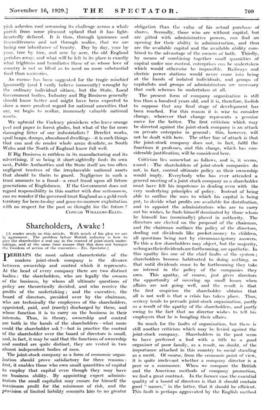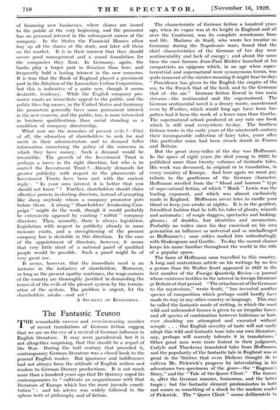Shareholders, Awake !
[A reader sends us this article. With much of his plea we are in agreement. The problem before British industry is how to give the shareholder a real say in the control of joint-stock under- takings, and at the same time ensure that this does not hamper the freedom of action of the executive.—En. Spectator.] PERHAPS the most salient characteristic of the modern joint-stock company is the divorce between ownership and control which it represents. At the head of every company there are two distinct bodies : the shareholders, who are legally the owners of the business, by whom all ultimate questions of policy are theoretically decided, and who receive the profits of the undertaking ; and the executive, the board of directors, presided over by the chairman, who are technically the employees of the shareholders, appointed, paid, and (rarely) discharged by them, and whose function it is to carry on the business in their interests. Thus, in theory, ownership and control are both in the hands of the shareholders—what more could the shareholder ask ?—but in practice the control of the shareholder over the board of directors is small, and, in fact, it may be said that the functions of ownership and control are quite distinct, they are vested in two almost independent bodies of men.
The joint-stock company as a form of economic organ- ization should prove satisfactory for three reasons : first, it enables those who own small quantities of capital to employ that capital even though they may have no business ability. By appointing expert adminis- trators the small capitalist may ensure for himself the maximum profit for the minimum of risk, and the Provision of limited liability commits him to no greater obligation than the value of his actual purchase of shares. Secondly, those who are without capital, but are gifted with administrative powers, can find an opening for their ability in administration, and thus are the available capital and the available ability com- bined to the advantage of the owners of both. Thirdly, by means of combining together small quantities of capital under one control, enterprises can be undertaken which would otherwise be impossible. Railways and electric power stations would never come into being at the hands of isolated individuals, and groups of capitalists and groups of administrators are necessary that such schemes be undertaken at all.
The present form of company organization is still less than a hundred years old, and it is, therefore, foolish to suppose that any final stage of development has been reached. For this reason it is wise to consider change, wherever that change represents a genuine move for the better. The first criticism which may be directed against the joint-stock company is an attack on private enterprise in general ; this, however, will not be dealt with here. The other line of attack is that the joint-stock company does not, in fact, fulfil the functions it professes, and this charge, which has con- siderable justification, will be considered here. - Criticism lies somewhat as follows, and is, it seenis, sound : --The shareholders of joint-stock companies do not, in fact, control ultimate policy as their ownership would imply. Everybody who has ever attended a general meeting of a joint stock company as a shareholder must have felt his impotence in dealing even with the very underlying principles of policy. Instead of being able to outline the uses to which his capital is being put, to decide what profits are available for distribution, and to appoint the administrators who are to carry out his wishes, he finds himself dominated by those whom he himself has (nominally) placed in authority. The directors are elected on the proposal of the chairman, and the chairman outlines the policy of the directors, dealing out dividends like pocket-money to children, all questions being met by circumnavigatory answers. To this a few shareholders may object, but the majority, so long as their dividends are forthcoming, are apathetic. In this apathy lies one of the chief faults of the system ; shareholders become habituated to doing nothing, so that until dividends cease to be forthcoming they take no interest in the policy of the companies they own. This apathy, of course, just gives directors the opportunity of covering up small losses when affairs are not going well, and the result is that the first suspicion the shareholder obtains that all is not well is that a crisis has taken place. Thus, secrecy tends to pervade joint-stock organization, partly as a result of the apathy of the shareholders, and partly owing to the fact that no director wishes to tell his employers that he is bungling their affairs.
So much for the faults of organization, but there is still another criticism which may be levied against the joint-stock company. Shareholders in the past seem to have preferred a fool with a title to a good organizer of poor family, as a result, no doubt, of the importance attached in this country to social standing as a merit. Of course, from the economic point of view, it is quite irrelevant whether a company director is a peer or a commoner. When we compare the British and the American methods of company promotion, we find a great contrast. In the former case the essential quality of a board of directors is that it should contain good " names," in the latter, that it should be efficient. This fault is perhaps aggravated by the English method of financing new businesses, where shares are issued to the public at the very beginning, and the promoter has no personal interest in the subsequent career of the company. In the States the Financial Houses often buy up all the shares at the start, and later sell them on the market. It is in their interest that they should secure good management and a sound foundation for the companies they float. In Germany, again, the banks play a larger part in flotation than here, and frequently hold a lasting interest in the new concerns. It is true that the Bank of England played a prominent part in the flotation of the Lancashire Cotton Corporation, but this is indicative of a quite new; though it seems desirable, tendency. While the English company pro- moter wants an immediate appeal to the public, and the public likes big names, in the United States and Germany the promoters generally have some permanent interest in the new concern, and the public, too, is more interested in business qualifications than social standing as a condition of company directorship.
What now are the remedies of present evils ?—First of all, the education of shareholders to seek for real merit in their administrators and to demand fuller information concerning the policy of the concerns in which they have money. Such a demand would be irresistible. The growth of the Investment Trust is perhaps a move in the right direction, but who is to control the Investment Trust ?—Already demands for greater publicity with respect to the placements of Investment Trusts have been met with the ancient reply : " In your own interest it is better that you should not know " ! Further, shareholders should claim effective powers in electing directors, instead of accepting like sheep anybody whom a company promotor puts before them. A strong " Shareholders' Awakening Cam- paign " might do the work, though it would probably be extensively opposed by existing " rabbit " company directors. Then, secondly, there is always legislation. Legislation with respect to publicity already in some measure exists, and a strengthening of the present company law is desirable in this direction. In the case of the appointment of directors, however, it seems that very little short of a national panel of qualified people would be possible. Such a panel might be of very great use.
It seems, however, that the immediate need is an increase in the initiative of shareholders. Moreover, so long as the present apathy continues, the wage-earners of the country are thoroughly justified in demanding the removal of the evils of the present system by the termin- ation of the system. The problem is urgent, let the shareholders awake—and act !
A STUDENT OF ECONOMICS.









































 Previous page
Previous page